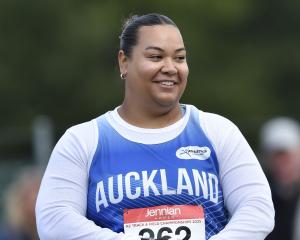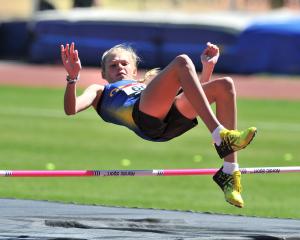It is 10 years since Tom Davie suffered a devastating injury that derailed his athletics career. He reflects on that day and the years that have followed with former Otago Daily Times sports reporter Alistair McMurran.
What might have been?A ruptured nerve in his left knee ended Tom Davie's international athletics aspirations a decade ago.
Davie's life changed dramatically during a training session at the Caledonian Ground on September 26, 2004.
A bounding drill near the long jump pit went badly wrong and ended his promising athletics career.
''I remember a ripping feeling and I flipped and landed on my back on the edge of the pit,'' Davie said.
''I couldn't stop screaming. I thought I'd broken my leg. The pain felt like I was being electrocuted. I'd never experienced anything like it before. It was horrible.''
Davie had ruptured the peroneal nerve in his left knee, as well as his lateral collateral and anterior cruciate ligaments (ACL). He could not move or feel his foot and was taken to Dunedin Hospital by ambulance.
''When I told the doctors in A and E I couldn't lift my foot, they realised it was serious. A surgeon assessed me and I was told I'd need an operation.''
Davie had the first of eight procedures (six surgeries in total, two of which included two procedures) three days later when his lateral collateral ligament was reattached to the head of his fibula.
''It was ruptured off the bone and they stuck it back on.''
Davie (28) has learnt a lot about the human body in the 10 years since the accident and now works as a corrective exercise specialist at Body Synergy in Dunedin.
He gives credit for his semi-recovery to the director of the clinic, Rowan Ellis.
''Before the injury I didn't know much about the human body - only how to use my own,'' he said.
Davie was told it would take at least two years to repair the ruptured nerve. He wanted to get back into athletics and remained positive, but two unsuccessful nerve graft attempts set him back.
''When the nerve operations failed, it hit me, and I was told by my doctor that I would live with paralysis and be disabled for the rest of my life,'' he said.
''It wasn't something I wanted to hear.''
The injury is called common peroneal leg palsy. He has lost a significant portion of the motor and sensory functions in his lower left leg and foot. An ACC assessment rated his disability at 24%.
''It was gutting and cruel to have those dreams taken away,'' Davie said.
''Other muscles had to compensate, so biomechanically my body is a bit messy. That's why I still pick up injuries.''
Davie was on target to represent New Zealand at the 2006 Commonwealth Games in Melbourne when he had the accident.
His best long jump of 7.70cm was just 15cm off the qualifying mark. Davie and coach Trevor Bent were confident he would qualify in the next two years.
''We had big plans,'' Davie said.
''I think Trevor took it quite hard and blamed himself. The accident was random and nobody's fault. Trevor shouldn't feel bad about it.''
Davie's attempt to get back into athletics could not work in such an explosive event. He was faster than most on a rugby field but another level of speed was needed in track and field. He would have had to learn to jump off his right foot as well.
Had there been no nerve damage, Davie would have had two surgeries to fix his LCL and reconstruct his ACL and be almost normal.
The injury ruined Davie's dream of competing at the Olympics and was a shattering experience for him.
''It was hard to come to terms with it. I still live with the effects and think about the injury every day.''
Davie, a multi-talented sportsman, gave up his ambitions in rugby and basketball to pursue athletics.
He had excelled at several sports and thoughts of a disabling injury never entered his mind. He had tweaked hamstrings and adductors previously, injuries that are part and parcel of explosive events.
''The injury came out the blue. It was the most random thing that ever happened to me,'' he said.
''You don't hear of many ruptured nerves when it comes to knee injuries, usually just ligaments and cartilage.''
Davie, still a carded athlete with the New Zealand Academy of Sport, turned his aspirations to the 2010 Winter Olympics when he realised his athletics career was over.
He trained three times a week with the academy's exercise physiologist, Angus Ross, who persuaded him to join the New Zealand bobsleigh team as a brakeman in 2008.
The bobsleigh dream ended at the world championships at Lake Placid in the United States in 2009 when the team crashed and the driver was injured.
Davie returned to Dunedin and scored three tries filling in for a friend's team in premier 2 grade rugby and was soon invited to join the top Taieri team that had been promoted back to the top grade in Dunedin club rugby.
Davie, a flying winger-fullback, scored 24 premier tries in 36 games from 2009 to 2013.
His 2012 rugby aspirations ended when he broke his fibula in a pre-season game after a successful season in Madrid, Spain, for Liceo-Frances, where he was the competition's leading try-scorer.
It was a comminuted fracture and took longer than expected to heal because of the severity of the break.
A childhood dream was to play rugby for Otago and emulate the deeds of his hero, All Black Jeff Wilson.
He grew up watching the successful Otago teams in the 1990s and went to games with his mother, Louise, while his father, Steve, was in the commentary box.
The complications from the knee injury that ended his athletics career also plagued his rugby and led to a series of injuries.
''One of the hardest things to take is to be labelled soft for being injured frequently,'' Davie said.
''But people who say that don't know my story, or what I've been through, or what I live with.''
Surgery on his Achilles tendon prevented him from playing rugby this year but he used his expertise as a pre-season trainer for the Taieri premiers.
A decade of operations and rehabilitation has improved Davie's life.
''I'm pain-free at the moment. It was nice when I could put my shoe on for the first time in 10 years.
''I've lost the function and feeling in two toes and they'd get caught when I tried to put on my shoe. You take these little things for granted.''
There is a noticeable muscle wasting in Davie's leg, which is riddled with surgical scars. The longest is 61cm.
Davie has been plagued by bad times over the last 10 years and got mentally down at times. He has been helped through the process by his supportive parents, his black Labrador dog Logi, and a few close friends who keep things light-hearted.
''There are people worse off so there is no point in feeling sorry for myself,'' Davie said.












